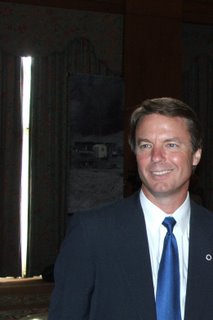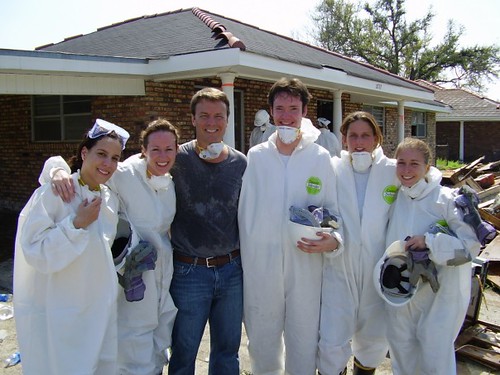JRE: Doing the Hard Work
 Challenging the Two Americas: New Policies to Fight Poverty - UNC Center on Poverty, Work and Opportunity Conference
Challenging the Two Americas: New Policies to Fight Poverty - UNC Center on Poverty, Work and Opportunity ConferencePhoto courtesy of NC Dem, OAC Blog
Expert panelists from varied backgrounds joined Sen. John Edwards, the center's director, to discuss policies that local and national policy-makers could put in place to alleviate the plight of the working poor.
"No matter what your political views are, we can surely all agree that we must address the fact that so many people are living in poverty in this, the wealthiest country in the world," Edwards said. "This conference, with its fantastic group of experts from all over the nation, is in response to what we at the Center on Poverty believe is a moral duty to tackle the issues that have created the shameful existence of the two Americas that exists today."
I'm looking forward to viewing the videos to be linked on the UNC Law School Center on Poverty, Work and Opportunity web site, where Edwards is the Director. One OAC blogger attended yesterday and said the conference sessions were very enlightening and walked away with hope. It is her picture of JRE that is posted above.
The RDU news had a quick clip about it too, along with a kewl initiative about Kids Cafe, a way for children after school hours to keep learning, motivated, and not to be latch-key kids. .
Indeed this 2-day conference had many good scholars there. The session I would have liked to have seen was this morning: "Economic Impact of Globalization on Poverty".
Globalization has led to the emergence of new economic powers and new challenges for America. This panel will assess the impact these changes are having on the American economy, with particular emphasis on the American worker.
Moderator: Senator John Edwards, Director, Center on Poverty, Work and Opportunity, UNC School of Law
Lael Brainard, Vice President and Director, Global Economy and Development Center, Brookings Institution, New Century Chair for Trade and International Economics
Patrick Conway, Professor of Economics, UNC Department of Economics
James K.Galbraith, Lloyd M. Bentsen Jr. Chair in Government/Business Relations and
Professor of Government, University of Texas at Austin
I'm betting they touched around the themes of Tom Friedman's "The World is Flat."
Associate Press produced a sardonic article about JRE and this conference. I'm not posting a link because one can find it in Yahoo in 2 seconds. I liked the pictures though.
JRE has been on the go for 3 weeks. Earlier this week, he was at Vandy speaking on Tuesday, then had to get ready for this conference.

Last week, he was with 700 students picking up debris in St. Bernard's Parish.
JRE posted his own log about his experience in NOLA:
"It would break your heart to see what we've seen. Block after block, each home is completely full of debris and it's infuriating to know that these families haven't been getting the help they need.
What is truly inspiring was seeing how determined and committed these college kids are to helping the families there. Kids from coast to coast - from over 80 schools from 27 states - have rolled up their sleeves and done the hard work that needs to be done. We were able to meet some of the homeowners and it's wonderful to know that these kids really did make a difference for these families.
There's much more work to be done, but please know that these kids were breaking their backs and making a big difference. We can make progress and get things done when we work together."
In two weeks, he will be on the road again: in Florida and Iowa.
Good job, JRE. I don't know how you do it--even with handlers. You are as you aptly put it on your OAC diary, "Doing the Hard Work that Needs to Be Done"--and leading others as well--for all of us.
Update for 3/25/2006: OAC blog was one of a few websites featured on faux news yesterday.
Click here to watch (hopefully this will work). Hat-tip to Wee Gordee and NCDem on the OAC blog for passing this on. Great pics of the blog and of course, JRE!


